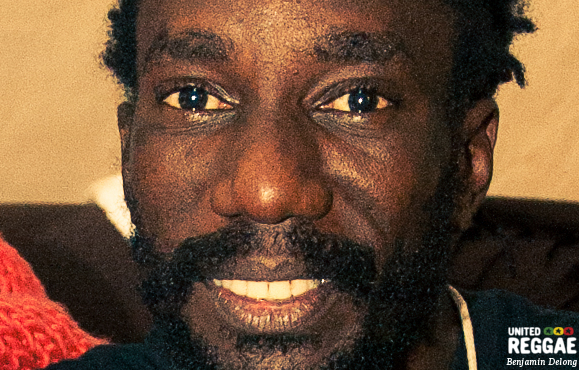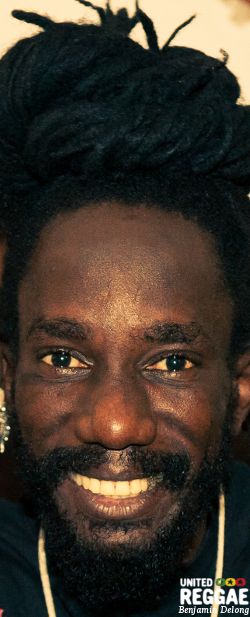Articles about reggae music, reviews, interviews, reports and more...
Interview: Sizzla (2013)
- Home
- Articles
- Interviews
- Interview: Sizzla (2013)

Interview: Sizzla (2013)
"Media hides the truth from the people. Music is about spirituality and about life"
Sampler
Sizzla makes music for the people
Jamaican fierce and controversial chanter Sizzla has recently put out his 70th album 'The Messiah', a mostly self-produced and self-written set released partly via his own imprint Kalonji Music. The album is as usual spiritual and conscious and for United Reggae Sizzla describes his aims with the album, the importance of doing good and also reveals three of his favorite albums.
The popular and insanely productive Jamaican deejay Sizzla has done his fair share of ridiculously wicked tunes, but also a truckload of bland output. The reason is not the man’s passion or talent, but his extremely prolific output. His most recent album 'The Messiah' is said to be his 70th. And that’s from an artist that has yet to turn 40.
He swept Jamaica like a storm when he arrived on the scene in the mid 90s and firmly established himself with the highly acclaimed albums 'Black Woman & Child' for Bobby “Digital” Dixon and 'Praise Ye Jah' for Phillip “Fattis” Burrell, both released in 1997. Together with singers such as Luciano and Mikey General and deejays like Capleton and Buju Banton, who both had shifted from slackness to a more conscious style in the mid 90s, Sizzla was part of the rising Rastafarian movement in Jamaica.
To me Sizzla like a myth, a living legend or an enigma. It might be because he’s not a media regular. I haven’t read many Sizzla interviews over the years, and those I’ve read are more about him rather than talking to him. So, when I had the chance to have a chat with him about 'The Messiah' I was terrified. When listening to his output and reading the stories he seems stern and heated. And angry at everything. He’s like a punk rocker that questions the society and how people think and act.

Media hides the truth
When I reach Sizzla he isn’t angry at all. Maybe a bit tired. He laughs and answers every question politely. He seems to have got every question before, because he answers fast and it feels like he knows what messages he wants to convey. And one of those things is never trust media.
“The people only know what the media is telling them and media is not promoting spiritual music. They hide the truth from the people. Music is about spirituality and about life,” he argues over a poor phone line from Jamaica, and continues explaining why he doesn’t think roots reggae is popular in his home country:
“Radio is not playing it because it tells the truth. The media don’t want to promote that music.”
According to Sizzla media helps the government to hide the truth from the people. The truth about how the society is really functioning and the bad economy many nations are facing. And he argues that nations might fall down if the truth is revealed.
For the people
He’s concerned about the state of the world, how black people are treated and how Europeans have exploited Africa.
“Things are happening in this world. It’s an economical crisis. Just check the news, listen to interviews on the radio, in newspapers and you can see the world is in a crisis. People with money are making themselves more money. We need to set structures to make nations for the people. It’s an evilous system that’s destroying the people and the planet,” he believes, and continues:
“Mama Africa has been captured and occupied. Africa is for the Africans, Europe is for the Europeans. They were lynching people, stealing our land, they stole from the people and need to repair the damage they have done. I point out such matters,” he says, and adds:
“Black people, and lots of other people, we’re all being persecuted and we’re looking for someone to come and lead us – Selassie, the Messiah. It’s about righteousness and preaching the spiritual. The Messiah is for the people.”
Doing good in society
There’s no doubt that Sizzla is a highly religious, devoted and spiritual person with great musical depth. He continues to come back to that he works for the people and for the Almighty and the importance of being righteous and doing good.
“I did the album for the most High, the Lord, our Shephard, the Messiah, the conquering lion of Judah, the King of Kings. One must seek the most High and take his examples, be kind-hearted, spread the love, making people happy and free the people,” he says.
For Sizzla it’s important to be a positive force in the community, both mentally and physically. Help the youths to find something to do and set up structures to develop and expose talents.
“We’re setting up sound systems, get studios up and running and have the tabernacle of the Almighty up and running,” he explains.
Doing the album himself
 According to Sizzla the album has received great response and he is proud that he made the album happen.
According to Sizzla the album has received great response and he is proud that he made the album happen.
“I made it for the people, I do the works of Jah and I’m working for the almighty. It has cultural aspects and it’s a great album,” he says and explains why he did most of the production himself:
“It was natural in my present situation. I’m writing the songs and it’s good that the same person writing the songs is also in charge of the spirit of the album, the mood and vibration. It’s not like that when other people are doing it for you.”
Favorite albums
When browsing album titles from Sizzla’s extensive catalogue you’ll notice a lot of them have cultural references – Royal Son of Ethiopia, Bobo Ashanti, Crucial Times and Praise Ye Jah are only a few examples. Titles are important to Sizzla and they are carrying his messages.
“Check the titles, check the names of the songs. I’m calling it out. Telling culture to the people. The Messiah was a logical follow up to The Scriptures.”
When discussing album titles I ask him if he has any favorite sets. I had anticipated a politically correct answer like ‘I love them all’ or ‘I rarely listen back to old albums, I’m looking for the next’, but he surprised me. Again. Sizzla is not politically correct. He tells it like it is.
“I have some favorites, sets I really like,” he says, laughing, and continues:
“Real Thing, I like the time and the mood, the atmosphere, the vibration that came out. I like Black Woman & Child, about restoring and building up Africa and for the black women. I also like Bobo Ashanti, it’s about Rastafari,” he reveals.
When the interview is over I feel kind of relieved in at least two ways. First because the interview is over. The phone line was really poor and I had to concentrate hard trying to understand his reasoning. Second because Sizzla wasn’t at all like I had pictured him. My view of Sizzla prior to the interview was mainly based on two sources – his music and the media, which we now know we should not trust.
Read more about this topic
Read comments (4)
| Posted by Tafadzwa Alfred Bandera on 06.27.2013 | |
| Sizzla loves Africa...and is proud of being Black...and his music is about Africa...The Most High...Positivity...and thats what matters,and in Africa people love him....and yes,He is right the media hide the truth...Jah bless Kalonji....Mama Africa loves you. | |
| Posted by leninejah fonseca on 11.11.2013 | |
| Jah bless Sizzla | |
| Posted by basutay aka mighty sizzzla on 11.24.2013 | |
| Bunch of love from I man and di whole a Africa, royal and highly salutation keep di fyah burning.... We love yah | |
| Posted by James on 02.21.2014 | |
| interesting interview, good read | |
Comments actually desactivated due to too much spams
Browse by categories
Recommended Articles
Latest articles
Recently addedView all
© 2007-2025 United Reggae. All Rights Reserved. Reproduction in whole or in part is prohibited. Read about copyright
Terms of use | About us | Contact us | Authors | Newsletter | A-Z














